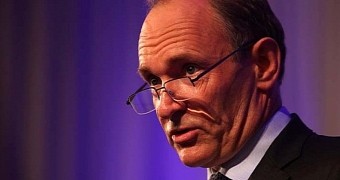Sir Tim Berners-Lee is defending a decision he made 25 years ago when he was creating the world wide web – not incorporating security in the platform.
Although hindsight is 20/20 and security would have come in handy nowadays, the computer scientist says that he just wanted to create a platform that developers would find easy to use and embedding security in it might have worked against the goal, The Register reports.
“[The web] might not have taken off if it had been too difficult,” Tim Berners-Lee said during the IPExpo Europe conference.
He also discussed the hot topic of the past few months – privacy. “The idea that privacy is dead is hopelessly sad. We have to build systems that allow for privacy,” he said, adding that people have the right to see how their data is being used.
He talked about “rich data,” preferring the term over to “big data,” saying that while people may have a right to know where their data is being used it’s also important for the appropriate bodies to have access to some of it. For instance, personal medical data should be available to doctors and emergency responders, but kept away from health insurance firms.
Considering that all this information is also being used for advertising purposes, Berners-Lee also addressed his issue, saying that this isn’t the future of the web, not entirely at any rate. “We should build a world where I have control of my data and sell it to you. Users should have control, access to and ownership of their data,” the father of the World Wide Web states.
Of course, such a business model would damage most Internet-based companies, including Google, Yahoo, Facebook and countless others.
Once more for Net neutrality
Berners-Lee also took the chance to address another hot topic these days – net neutrality. The computer scientist states that we need to fight for net neutrality, something that he’s said on other occasions too.
“The Internet is a platform. It doesn’t have an attitude about what you do with it. We need to keep fighting for net neutrality… an Internet without attitude,” he pointed out.
He is referring to the high possibility that Internet Service Providers could start throttling with access speeds for sites they don’t agree with or for those that do not agree to pay for access to the so-called “fast lane.”
The FCC still has to rule on the issue and if they’re going to listen to the millions of people who contacted them, we shouldn’t really worry. An overwhelming part of those who sent in comments to Commission have asked for them to protect net neutrality, to not allow companies to create fast lanes and to reclassify ISPs on Title II.

 14 DAY TRIAL //
14 DAY TRIAL //